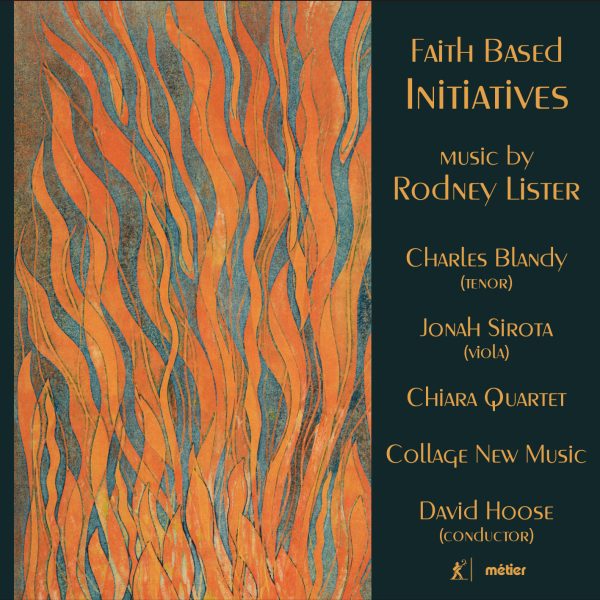Fanfare
The UK-based record label Metier has a habit of picking winners, and the music of Rodney Lister (b. 1951) is no exception. His music has previously cropped up in Fanfare’s august pages on an Arsis disc (Fanfare 28:6), while his Squares and Oblongs appeared on a multi-composer Summit compact disc entitled Expanding Spaces, which I covered in issue 43:1 and which initially piqued my interest in this composer. Lister studied with Peter Maxwell Davies, and the present disc’s booklet includes an appreciation by fellow composer Nico Muhly.
The pieces here are nicely contrasted. Faith-Based Initiative (from which the disc gets its name) is a 10-minute exploration of the well-known hymn tune Come, Thou Font of Every Blessing. The Chiara Quartet gives a wonderfully varied account, from the obviously hymnic to the angular dancing that appears. Interestingly, one section of the score includes three “conjoined sort of fugal expositions,” in the composer’s own words. When the melody returns it has a sort of Goldberg-like reframed serenity and consolation about it, a sort of golden aura: all this within the space of a few minutes.
Written for solo viola, Complicated Grief is given a simply stunning performance by Jonah Sirota, the violist of the Chiara Quartet. Music can be a healing experience for composers as well as performers and listeners, and so it seems here: Complicated Grief was written in response to the death of the composer’s father. The title refers to a particular response to the death of a loved one used by bereavement counsellors; Lister assures us this was not the case with him, but the concept interested him. He certainly writes sadness into the piece, but there are moments of sudden anger. At nearly 25 minutes, this is a long piece for solo viola, but it is gripping as we trace the various emotions and stages of grief through the three movements: “Fantasia”; “Variance”; “Quodlibet.” There are surely moments of pure pain written into the “Fantasia,” while long lines sing soulfully. Lister takes known music around Southern hymn tunes and effectively deconstructs them. The result is very challenging for the player, and the level of control Sirota shows over his instrument is remarkable, particularly in the second and longest movement, “Variance,” both in terms of sustained high harmonics and lower, more active gestures. While the final “Quodlibet” allows the wistfulness of the melodies to dissolve in time beautifully, Sirota’s performance is infinitely tender.
Finally, there comes a piece for voice and ensemble, Friendly Fire. The final song, “For the Union Dead,” comes with an “important note” in the booklet, as it includes a racial trigger word. But Lister’s setting of the various texts he chooses is strong and considered and, most of all, from the heart. The tenor Charles Blandy is a new name to me, but with such beauty of voice and such understanding of both line and word, he is quite a find. From his biography, he performs much early music, which possibly accounts for the purity of his sound. He is no stranger to newer music though, numbering John Harbison’s The Great Gatsby in his repertoire. The spur to composition was Ken Burns’s Civil War documentary series, with thoughts revivified at the onset of the Gulf War. Again, found material has a place (fragments of patriotic songs such as Battle Hymn of the Republic and Shouting the Battle Cry of Freedom), and here the composer himself acknowledges the shadow of Charles Ives (in the setting of the poem by Melville about the first battle of Bull Run, and one just cannot miss the Ives references). The instrumental performances are superb and alive, and the recording allows every bit of detail to come through. The emphasis on conflict inevitably connects to the basis of Complicated Grief in particular. The New England ensemble here (College New Music of the New England Conservatory, Boston) is superb. Coming in at just under 40 minutes, this is a major statement. Lister’s range of emotion and sheer range of imagination is most impressive.
This is a wonderful disc, faultlessly produced and recorded. Maybe it is Rodney Lister’s time for full recognition; on the basis of this evidence, I do hope so.
@divineartrecordingsgroup
A First Inversion Company
Registered Office:
176-178 Pontefract Road, Cudworth, Barnsley S72 8BE
+44 1226 596703
Fort Worth, TX 76110
+1.682.233.4978












